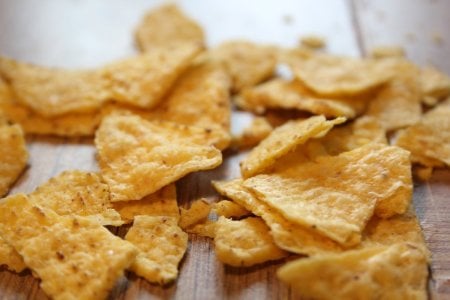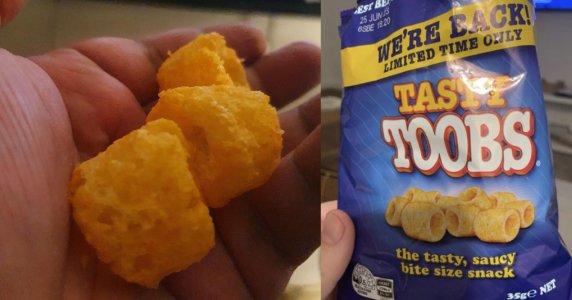What’s making your favourite snacks taste different?
Have you ever crunched into a chip, only to realise it doesn’t taste the same? You’re not alone.
Many Aussies have noticed this shift in their favourite snack flavours, and the intriguing story behind it is finally coming to light.
The subtle change in flavour—from Doritos to Twisties—primarily comes down to a change in cooking oil.
So, yes, your palate isn’t tricking you; your snacks have indeed changed.
In 2019, Smith’s Snackfood Company, a subsidiary of PepsiCo and the manufacturer of some of Australia's most popular snacks, announced a significant switch and opted for Australian canola oil as the cooking oil for their products.
This shift affected popular snacks like Doritos, Tostitos Cantina Tortilla Chips, Twisties, Burger Rings, and Cheetos.
Smith reported that this change ‘significantly reduced the saturated fat content’ of these snacks by up to 86 per cent.
This decision came after the Tasty Toobs snack faced backlash for appearing to shrink to ‘half the size’.
On social media, some wondered if Tasty Toobs’ flavour had also changed, with comparisons being made to tomato sauce.
‘They just lack the flavour they once had,’ lamented one user.
A disappointed social media user pondered about Tasty Toobs’ potential ‘change in formulation’, asking: ‘Is it a bad batch?’
Others also observed a difference in the new Tasty Toobs.
One comment read, ‘The new ones seem to taste slightly different too, both my wife and I think so. They are still good, though, but slightly different from what they were years ago.’
While another user observed, ‘The last few packs I’ve had, I feel like they’re almost thinner, like they’re not as puffy.’
Users pointed out that Tasty Toobs were produced in two factories, one in Poland and one in Australia.
According to one user, ‘The ones made in Australia have a better texture and taste,’ with the origin listed on the packaging.
‘It will state on the rear bottom left of the pack where they are manufactured.’
A Smith’s spokesperson shared: ‘We are looking to move to 100 per cent Australian-made Toobs by the end of the year.’
Meanwhile, Cheezels and Burger Rings also faced criticism in New Zealand in recent years for becoming increasingly ‘stale’ and ‘brittle’.
While some speculated a ‘lower quality’ cheese was to blame, the company attributed it to an oil change.
PepsiCo ANZ CEO, Danny Celoni, explained that adopting Australian canola oil aligns with the company's health objectives.
‘Smith’s chips made the shift to Australian canola oil in 2018, and we are proud to have now rolled out this change to more of our great snack brands like Doritos and Twisties,’ he said in a statement.
‘We know that consumer needs and preferences are changing, and Australians are more concerned about their health and wellness than ever before.’
This transition means over 90 per cent of the company's Australian snacks contain no more than 1.1 grams of saturated fat per 100 calories.
‘We have been making changes to our portfolio, products and packaging to ensure we can meet our consumers’ needs,’ he continued.
‘The team has been working to reduce the added sugars, saturated fat and sodium in our food and beverages.’
He also highlighted the positive impact of using Australian canola oil on local farmers, with approximately 14,000 tonnes sourced from farms in New South Wales and Victoria.

Members, have you sensed a flavour shift in your go-to snacks? Would you prefer a healthier option even if it tastes different, or are you fond of the original taste? Share your thoughts below!
Many Aussies have noticed this shift in their favourite snack flavours, and the intriguing story behind it is finally coming to light.
The subtle change in flavour—from Doritos to Twisties—primarily comes down to a change in cooking oil.
So, yes, your palate isn’t tricking you; your snacks have indeed changed.
In 2019, Smith’s Snackfood Company, a subsidiary of PepsiCo and the manufacturer of some of Australia's most popular snacks, announced a significant switch and opted for Australian canola oil as the cooking oil for their products.
This shift affected popular snacks like Doritos, Tostitos Cantina Tortilla Chips, Twisties, Burger Rings, and Cheetos.
Smith reported that this change ‘significantly reduced the saturated fat content’ of these snacks by up to 86 per cent.
This decision came after the Tasty Toobs snack faced backlash for appearing to shrink to ‘half the size’.
On social media, some wondered if Tasty Toobs’ flavour had also changed, with comparisons being made to tomato sauce.
‘They just lack the flavour they once had,’ lamented one user.
A disappointed social media user pondered about Tasty Toobs’ potential ‘change in formulation’, asking: ‘Is it a bad batch?’
Others also observed a difference in the new Tasty Toobs.
One comment read, ‘The new ones seem to taste slightly different too, both my wife and I think so. They are still good, though, but slightly different from what they were years ago.’
While another user observed, ‘The last few packs I’ve had, I feel like they’re almost thinner, like they’re not as puffy.’
Users pointed out that Tasty Toobs were produced in two factories, one in Poland and one in Australia.
According to one user, ‘The ones made in Australia have a better texture and taste,’ with the origin listed on the packaging.
‘It will state on the rear bottom left of the pack where they are manufactured.’
A Smith’s spokesperson shared: ‘We are looking to move to 100 per cent Australian-made Toobs by the end of the year.’
Meanwhile, Cheezels and Burger Rings also faced criticism in New Zealand in recent years for becoming increasingly ‘stale’ and ‘brittle’.
While some speculated a ‘lower quality’ cheese was to blame, the company attributed it to an oil change.
PepsiCo ANZ CEO, Danny Celoni, explained that adopting Australian canola oil aligns with the company's health objectives.
‘Smith’s chips made the shift to Australian canola oil in 2018, and we are proud to have now rolled out this change to more of our great snack brands like Doritos and Twisties,’ he said in a statement.
‘We know that consumer needs and preferences are changing, and Australians are more concerned about their health and wellness than ever before.’
This transition means over 90 per cent of the company's Australian snacks contain no more than 1.1 grams of saturated fat per 100 calories.
‘We have been making changes to our portfolio, products and packaging to ensure we can meet our consumers’ needs,’ he continued.
‘The team has been working to reduce the added sugars, saturated fat and sodium in our food and beverages.’
He also highlighted the positive impact of using Australian canola oil on local farmers, with approximately 14,000 tonnes sourced from farms in New South Wales and Victoria.
Key Takeaways
- The reasons behind the changed taste of some favourite Aussie snacks have been revealed: a switch in cooking oil.
- Smith’s Snackfood Company has adopted Australian canola oil, significantly reducing saturated fat in their products.
- Popular snacks, including Doritos, Twisties, Burger Rings, and Cheetos, were affected by this change.
- PepsiCo ANZ’s CEO views this shift as catering to evolving consumer health preferences.
Last edited:









